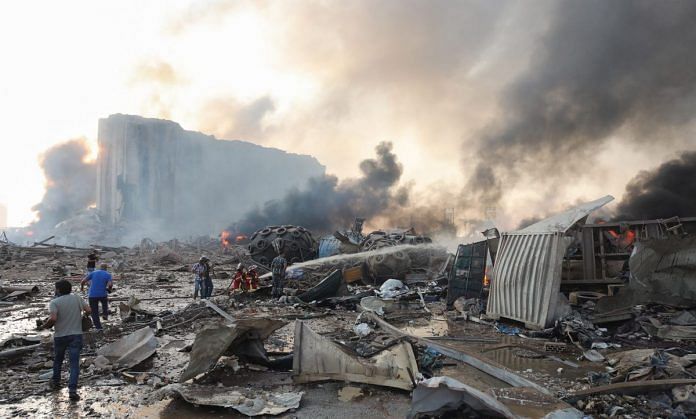More than a hundred dead, thousands injured and hundreds of thousands rendered homeless: The human toll of the massive explosions in Beirut on Tuesday demands an immediate response from the rest of the world. It is no exaggeration to say that many will die, or be permanently maimed, if succor doesn’t come quickly.
But the tragedy also puts the world’s leaders and lenders on the horns of a familiar dilemma: How to help a stricken people without empowering their shady — and sinister — rulers?
The quandary was raised recently in Iran, when the government of the Islamic Republic sought $5 billion from the International Monetary Fund to deal with the coronavirus outbreak. At the time, I argued that the regime in Tehran could not be trusted with cash: The risk was too great that the money would be siphoned into Iran’s well-established program of spreading terrorism and sectarian violence across the Middle East. Better to offer material help — food, medicine, doctors and nurses — instead.
Tellingly, the Iranian government insisted on cash, which it has not received, and chose to let its people suffer rather than accept Western offers of non-monetary assistance. It has since tried to conceal the extent of the coronavirus crisis by fudging the figures. The real death toll may be more than three times higher than announced.
Lebanon, for all its political dysfunction and economic chaos, is for the most part an open society. The government of Prime Minister Hassan Diab will gladly accept offers of assistance from all comers — with the possible exception of Israel. Rescue and relief groups from all over the world are on their way to Beirut. Food and other emergency supplies will be arriving, as well.
But the profoundly corrupt political elite that runs the country will not miss this opportunity to ask for money too. And therein lies the dilemma.
There’s no question Lebanon will need the cash. Beirut has suffered enormous physical damage: The city’s governor estimates it will cost between $3 billion and $5 billion to repair.
Under normal circumstances, the Lebanese diaspora could be relied upon to pick up much of the tab. But in recent months, the parlous state of the Lebanese economy — and especially the collapse of its currency — has prompted many to take their money out of the country. They will send cash back in to support friends and family, but investing in reconstruction requires a faith in the management of the economy and confidence in the banking system that doesn’t currently exist.
As with Iran, there is a danger that aid money will be diverted from its intended purpose — whether to line the pockets of Lebanon’s famously venal politicians, or worse, furnish the coffers of Hezbollah, which acts as Iran’s catspaw across the region.
Fear of money falling into the hands of Hezbollah has kept the Gulf Arab states from bailing Lebanon out of its current economic crisis, as they have in the past.
That leaves the IMF, which even before Tuesday’s tragedy was in talks with the Diab government for a $10 billion loan. But those negotiations had stalled over the government’s inability to agree on an economic reform plan. Economy Minister Raoul Nehme was being optimistic when he said he might get half that amount last week.
The IMF might now be willing to talk of a larger sum, to incorporate Beirut’s reconstruction needs. But the risk of misuse may be greater in the chaos following the blasts, so it should be even more insistent on transparency.
The scale of the tragedy should shake the government — and the entire political class — into its senses about the need for reforms. Even Hezbollah, surely, must now recognize that a bailout, with strings attached, is inevitable — and urgent. At a bare minimum, the government should allow a system of international supervision of how reconstruction money is spent. Failure to secure assistance at a moment when there is so much sympathy for Lebanon would be disastrous.
The world wants to help the Lebanese. The politicians in Beirut must help us help them. – Bloomberg
Also read: Lebanon officials ignored warnings on ammonium nitrate behind deadly Beirut blast




Prior to the influx of the Palestinian refugees in the wake of the 1967 conflict, Lebanon was called Paris of east, where the second rung Arabs used to go womanizing and for keeping European mistresses in fancy apartments and villas. While the rulers did the same in Europe and UK. It was a place where one could go skiing and sun bathing on the same day. The Christens were 60% and Muslims 40% with a well-established power sharing arrangement.
Lebanon had no economy, other one run by touts with low morality and unimaginable corruption with established smuggling routes to IRAQ and Syria. A heaven for the shadow banking touted as the financial hub of east. It was only a matter of time before the governance collapsed and then, free for all, stating from late 70s.
The main players supported by various powers are, the Marinate Christens, the Druz, Shia, Sunni groups and private armies of gangsters. The moneyed moved to France and a big lot to places like Nigeria, Venezuela and Caribbean, fertile lands for sustaining corrupt practices.
The Ammonium Nitrate has blown up but there must be warehouses full of toxic chemical wastes prohibited or very expensive to destroy being stored for a price.
The country is finished. A living example of what will happen to other counties of the middle east with raging uncontrolled conflicts under a potent mix of religion and corruption.